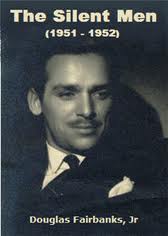The Silent Men

First broadcast in October of 1951, The Silent Men aired for 30 minutes on Sundays until March of 1952 and then took a Wednesday time slot until May, 1952. The show was dramatic intrigue, with an excellent cast consisting of Douglas Fairbanks, Jr., William Conrad and Herb Butterfield.
Supporting actors in the show’s cast included Lurene Tuttle, Virginia Gregg, Raymond Burr and Paul Frees, among others. Don Stanley was the announcer and Warren Lewis produced and directed.
Fairbanks played the role of a different Federal agent on each show – from the Department of Commerce, Immigration, the Postal Service and other government organizations. Conrad was “the chief.” That role was later played by Herb Butterfield.
The Silent Men was a show that paid tribute to the undercover men working in intelligence and sometimes putting their lives in jeopardy. Fairbanks was perfect for the role because he had actually worked in espionage and other jobs in special operations for the State Department and the U.S. Navy during World War II.
With Fairbanks’ real-life undercover experience and his incredible acting and producing skills, NBC was eager to get The Silent Men into production. It wasn’t as successful as they hoped and speculation is that it was because NBC kept a secret of Fairbanks intriguing background, which would have been a great promotional element for the show.
The Silent Men began with the phrase, Stories about the special agents of all branches of our federal government who daily risk their lives to protect the lives of all of us – to guard our welfare and our liberties, they must remain nameless – THE SILENT MEN!
At the beginning of each episode, Fairbanks’ character met with his chief (Conrad) to get his assignment and then left on the dangerous journey. Since Fairbanks portrayed many men from various agencies, The Silent Men was a fantastic morale boost to the agents and their families, who went unrecognized during the height of the war.
Just after the war there was a need and liking for patriotic stories, and The Silent Men definitely fell into this category. The fact that the stories were based on true life tales, made them even more desirable.
During World War II, stories of intelligence warfare were rarely revealed, and just after the war, people loved hearing about these interesting reports that they had heard so little about. Now that we know the background of Douglas Fairbanks and his covert activities during the war, these Silent Men vignettes have become highly collectable for their historic value.
Happy listening my friends,
